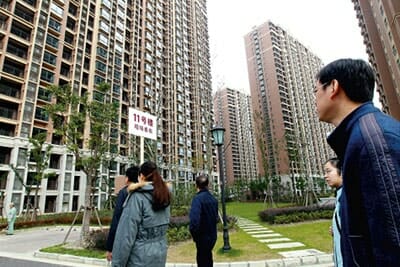
First tier markets such as Shanghai would be excluded from the policy reversal
China’s government signalled that it is eager to revive the country’s housing market on Friday when the official China Securities Journal reported that the central authorities would allow cities to ease policy restrictions on home sales depending on market conditions.
On Thursday, the newspaper Southern Weekly had reported that the central government was allowing cities other than Beijing, Shanghai, Guangzhou and Shenzhen to open up their residential real estate markets
More Freedom for More Than 30 Markets
Since China began introducing policy measures to tame runaway real estate prices in 2010, local governments have been required to abide by a number of restrictions, including higher downpayment levels, and rules that prevent existing homeowners from buying more than one additional property.
These policies were primarily put in place for China’s larger cities, where market prices had risen the highest, and in total are estimated to have affected more than 40 communities.
The policy change alluded to by the media reports is believed to mean that these rules will begin to change for more than 30 large markets, other than the first-tier cities, but it is not yet clear what policies will be allowed to be rolled back in which communities.
Investors Encouraged
China’s property stocks received a big boost from the media reports, with an index of developers on the Shanghai exchange rising 2.1 percent by closing time on Friday, the biggest jump in more than a month.
Some of the country’s largest developers led the rally with China Overseas land rising 5.4 percent in Hong Kong, Vanke going up 3.3 percent in Shenzhen, and Poly Real Estate gaining 4.3 percent in Shanghai.
Questions on Policy Impact
While the change in policy is certain to breathe some life into China’s stalled property markets, the impact could be more limited than it would first appear.
Other than increased downpayment levels for first tier cities, there have been no major new policies introduced since the middle of last year, when the market was enjoying record levels of price increases and sales volumes. It was near the halfway-point of 2013 that the Xi administration decided to use credit controls rather than laws to cut back on speculation.
Since that time the market has slowed considerably.
For the time being, while the government has indicated that it will loosen up mortgage policies, it appears that it is only the administrative rules on sales that will be relaxed, not the cutbacks in loans to developers that have led companies like Greentown to sell out, and Zhejiang Xingrun to collapse.
Economist Andy Xie believes that the removal of policies restricting housing sales could actually bring prices down further, by flooding the market with properties.
The former top economics guru for Morgan Stanley in Asia last week wrote,
Eliminating purchase restrictions are often touted as the magic potion for reversing the price trend. This would have the opposite effect. China’s purchase restrictions helped inflate, not cool the bubble. A family needs one property. When the government says that each can only have one, it incites people’s speculative fervor to buy more, as people hope prices will go higher upon the eventual reversal of the policy. Hence, many couples faked divorce to buy more. This speculative inventory is huge. When the restrictions are eliminated, it could come to the market at the same time. The consequences are easy to imagine.
The Mingtiandi view is that the major cause of the slowdown is the loss of buyer faith in the inexorable rise of China’s housing prices. The removal of policy restrictions, if it leads to rapid restoration of sales volumes and price growth recovery, could restore that faith, but it depends on the degree to which administrative measures, and credit restrictions are relaxed.
Leave a Reply